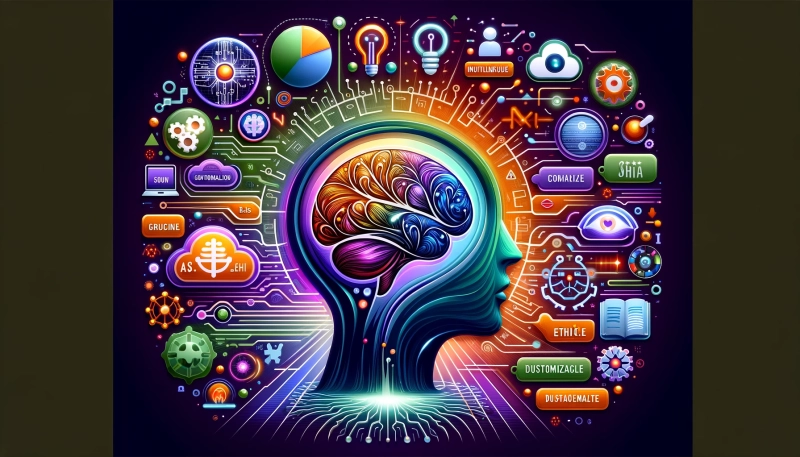Healthcare Sector: Innovations and Challenges
Innovations in Patient Care and Diagnostics
Generative AI is significantly impacting the healthcare sector. It's being used to develop personalized medicine, create virtual models for patient scenarios to improve diagnosis accuracy, and analyze patient health records to conceive innovative digital health solutions (mondaq). This AI-driven approach enhances patient care by enabling earlier and more accurate disease identification, increasing the speed and accuracy of basic triage, and creating personalized treatment plans.(brookings)
Navigating Regulatory and Ethical Landscapes
However, the integration of generative AI in healthcare comes with legal and ethical complexities. Products and services using generative AI for diagnosis and treatment may be categorized as medical devices, subjecting them to FDA scrutiny. This process can be lengthy and costly, with a focus on ensuring the safety, effectiveness, and reliability of such technologies (mondaq). Ethically, it is essential to reduce data bias and maintain a balance between technology and human expertise, ensuring accurate diagnoses and appropriate treatment recommendations.(brookings)
Legal Sector: Adaptation and Limitations
Integration in Legal Practices
The legal sector is also experiencing a transformation due to generative AI. Legal professionals are increasingly adopting AI for tasks like contract drafting, which are formulaic and well-suited to AI's capabilities. However, more complex areas such as litigation present challenges for generative AI, as these require a level of understanding and interpretation that AI models have yet to master. (techtarget,law)
Addressing Accuracy and Ethical Concerns
Accuracy and ethics are paramount in legal practice. Generative AI models can sometimes produce 'hallucinations' – incorrect outputs that could lead to misinterpretations of laws or facts. This necessitates careful validation and verification of AI-generated content in legal settings. The responsibility for inaccuracies falls significantly on the attorneys, as seen in cases where reliance on AI without proper verification has led to sanctions. (techtarget)
Finance Sector: A New Age of AI Capabilities
Transformative Potential in Finance
Generative AI holds tremendous potential for transforming the finance sector. It can automate and augment processes like financial analysis and reporting, risk mitigation, and optimization of financial operations. This technological advancement could lead to significant productivity increases and cost savings.(deloitte)
Challenges and Workforce Adaptation
However, the integration of generative AI in finance is not without its challenges. It requires upfront investment in time and money, and finance professionals need to develop new skills such as prompt engineering, bias recognition, and quality validation of AI outputs. There's also a need for change management, as workers may be skeptical about trusting AI technology.(deloitte)
Conclusion
Generative AI is significantly impacting the healthcare sector. It's being used to develop personalized medicine, create virtual models for patient scenarios to improve diagnosis accuracy, and analyze patient health records to conceive innovative digital health solutions (mondaq). This AI-driven approach enhances patient care by enabling earlier and more accurate disease identification, increasing the speed and accuracy of basic triage, and creating personalized treatment plans.(brookings)
Navigating Regulatory and Ethical Landscapes
However, the integration of generative AI in healthcare comes with legal and ethical complexities. Products and services using generative AI for diagnosis and treatment may be categorized as medical devices, subjecting them to FDA scrutiny. This process can be lengthy and costly, with a focus on ensuring the safety, effectiveness, and reliability of such technologies (mondaq). Ethically, it is essential to reduce data bias and maintain a balance between technology and human expertise, ensuring accurate diagnoses and appropriate treatment recommendations.(brookings)
Legal Sector: Adaptation and Limitations
Integration in Legal Practices
The legal sector is also experiencing a transformation due to generative AI. Legal professionals are increasingly adopting AI for tasks like contract drafting, which are formulaic and well-suited to AI's capabilities. However, more complex areas such as litigation present challenges for generative AI, as these require a level of understanding and interpretation that AI models have yet to master. (techtarget,law)
Addressing Accuracy and Ethical Concerns
Accuracy and ethics are paramount in legal practice. Generative AI models can sometimes produce 'hallucinations' – incorrect outputs that could lead to misinterpretations of laws or facts. This necessitates careful validation and verification of AI-generated content in legal settings. The responsibility for inaccuracies falls significantly on the attorneys, as seen in cases where reliance on AI without proper verification has led to sanctions. (techtarget)
Finance Sector: A New Age of AI Capabilities
Transformative Potential in Finance
Generative AI holds tremendous potential for transforming the finance sector. It can automate and augment processes like financial analysis and reporting, risk mitigation, and optimization of financial operations. This technological advancement could lead to significant productivity increases and cost savings.(deloitte)
Challenges and Workforce Adaptation
However, the integration of generative AI in finance is not without its challenges. It requires upfront investment in time and money, and finance professionals need to develop new skills such as prompt engineering, bias recognition, and quality validation of AI outputs. There's also a need for change management, as workers may be skeptical about trusting AI technology.(deloitte)
Conclusion
Customized generative AI models are revolutionizing various business sectors, offering tailored solutions that align with specific industry needs. While the advancements in healthcare, legal, and finance sectors are promising, they come with unique challenges, including regulatory, ethical, and accuracy concerns. As these industries continue to evolve with AI, it is crucial for professionals to adapt and integrate AI responsibly, ensuring that its benefits are maximized while mitigating potential risks.
How is your sector adapting to the integration of generative AI, and what challenges do you foresee in its implementation?



